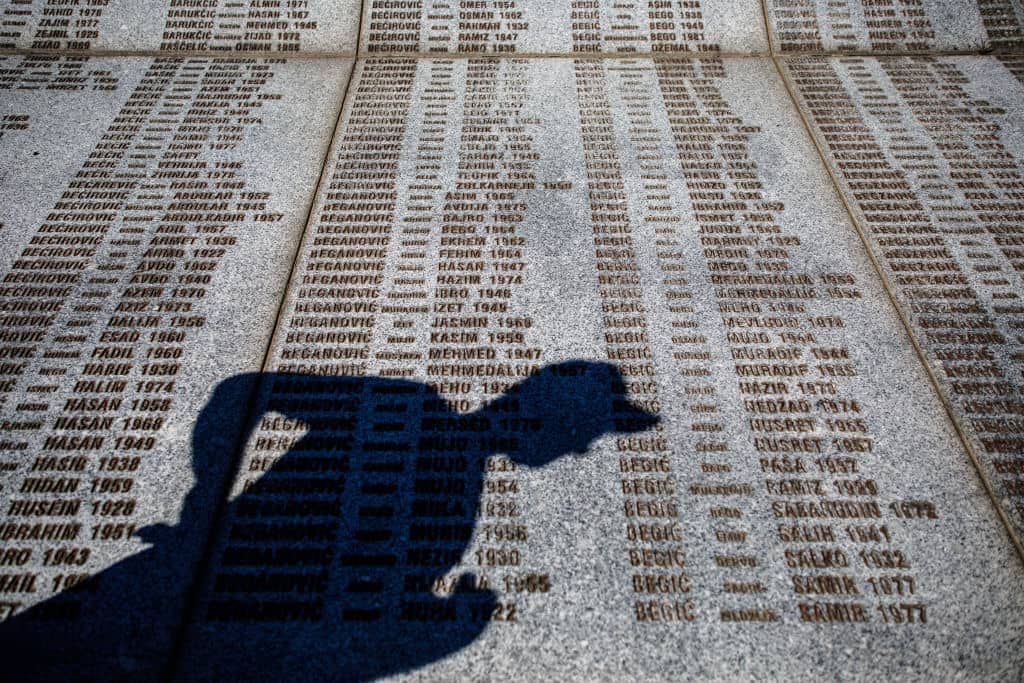Is Bosnia and Herzegovina on the brink of war? Christian Schmidt, the UN’s high representative, has warned that the country is in imminent danger of breaking apart. The return of armed conflict is a ‘very real’ prospect, he has said. Schmidt has good reason to be alarmed.
His warnings follow an announcement last month by Milorad Dodik — leader of the Bosnian Serbs and member of Bosnia and Herzegovina’s tripartite presidency — that he plans to undertake steps amounting to secession, even if that’s not the word he is using, for now. And with any plan for secession, the very real threat of conflict and ethnic cleansing should be at the forefront of our concerns.
Dodik’s ambition appears to be to gradually undermine Bosnia’s state-level institutions. In their current set-up, the three main ethnic groups hold equal power to veto all decisions. Dodik’s group has used this arrangement to render the government inactive for months now. His plan, in the meantime, is to set-up a separate statelet in Republika Srpska — a scheme that would hand power to the Serbian majority (which makes up over 80 per cent of the population) and could place the Bosniak and Croat minorities under threat. It could include taking action to stop intelligence services and police (currently controlled by the government) from operating inside the new entity. Most worryingly of all, a separate army not including Bosnians could be created.
For now, the EU is distracted by Belarus and the dire situation playing out on its borders with Poland
Might these events tip the country into war? It certainly seems plausible that Bosnia and Herzegovina is heading towards the type of situation that pre-empted the decade-long conflict that followed the break-up of Yugoslavia. That war led to more than 100,000 deaths, and millions of people being displaced. It also resulted in the most recent act of genocide on European soil, when 9,000 Bosnians were killed in the Srebrenica massacre.
That crime lies at the heart of Dodik’s most recent provocations. A law criminalising denial of the 1995 Srebrenica genocide committed by Bosnian Serb forces or other war crimes was imposed in July. Ever since, Dodik and his allies have been on the warpath. The genocide designation has been consistently rejected. And Bosnian Serb officials have refused to participate in the country’s state-level institutions, effectively blocking their function entirely.
The Balkans is an area plagued by conflict, and this situation has left the region vulnerable to a fresh outbreak of violence. There is no easy fix. Yet the EU’s response – or lack of it – is surely making tensions worse.
In the aftermath of the war, the ravaged Balkan states were effectively given a promise: rebuild and the path to EU accession is open for you. But this promise has been broken, again and again, in dramatic fashion.
The EU has not only disengaged from the events in Bosnia, but has also left Northern Macedonia hanging. This, of course, is a country that sacrificed more than most to achieve a deal with Greece over its name, and which is now watching as France’s president Emmanuel Macron blocks EU enlargement. Both these cases have sent a signal across the region that the EU has little intention of honouring its word, even if a state is as far down the road of accession as Northern Macedonia is.
It also sends a message to powers like Turkey and Russia that the door is open for them to win the strategic advantage in the region. In the place of hope, nationalism flourishes now. In this climate, Russia and Turkey are vying to increase their influence, creating a major geopolitical risk for Europe, and dark prospects for the region’s long-suffering population. Both countries are looking to deepen ties with specific ethnic groups, playing up cultural ties and pushing for deeper economic and trade relations in key sectors from energy, to banking, and real estate in an attempt to create political and economic dependence. The ultimate aim is to stop further integration with Western political and security institutions. These efforts prove to be destabilising factors that contribute to ethnic tensions time and time again.
For now, the EU is distracted by Belarus and the dire situation playing out on its borders with Poland. It seems that Brussels is incapable – or at the very least unwilling – to see that the multiple crises unfolding in its Eastern borders have a common source: inaction against malign actors like Russia and Turkey, carelessness in its treatment of internal cohesion amongst member states, and a lack of vision for the future of the union and the continent.






Comments